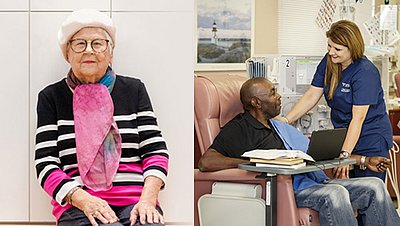Visit our facts & figures 2023 page.
We are committed to advancing global health equity
Dr. Eneanya, can you tell us what health equity means exactly?
ENEANYA: Everyone should have a fair opportunity at attaining their full health potential, and no one should be disadvantaged or kept from achieving this potential based on where they live or on their sex, gender, race/ethnicity, disability, or sexual orientation. Health equity has been brought to the forefront in the U.S. because of all the racial injustice we have witnessed throughout the pandemic, as well as inequities in connection with socio-economic conditions in general. There are subpopulations, mostly racial and ethnic minorities, that tend to have the worst health outcomes. Taking care of patients is actually only a small part of health care. A dialysis machine doesn’t guarantee that somebody has access to safe, nutritious food or lives in a secure, adequate home. Yet a meager diet and unsafe living conditions are all social determinants that are associated with poor health outcomes.
Are there any projects or initiatives that you are particularly proud of?
ENEANYA: Obtaining sound data is a key objective because it helps us track and monitor not only inequities but also progress. We have built two dashboards that hold great promise. One allows us to identify inequities around home dialysis and transplant care at a very granular level by region, race/ethnicity, language or age. We can dive in and see the areas with the greatest need and figure out what the problem is, for instance whether it’s a referral issue or whether the patient is unable to follow up clinic visits. The second dashboard tries to track the disparities in terms of who is referred for transplant evaluation. It will help dialysis centers to gather all the data they need to refer a patient to a transplant center. It’s a one-stop shop that also allows us to see the patient’s progress. We are also looking into how we can incorporate more social determinants into our medical records. It’s important that patients are able to self-report these details – where and how they live, whether they receive social support and whether food or housing security is an issue – in a setting where they feel comfortable. If we can identify people who are struggling with these issues, we can work with local community partners to help them.
How can we improve equitable access to health care globally, not just in the U.S.?
ENEANYA: We know that a lot of the information captured in medical records in the U.S. is not standard abroad. In some regions, for example, there are regulations about reporting race and ethnicity. To make a difference, though, we really need to identify the subpopulations with poor health outcomes in other countries and find the reasons why. Some of the outcomes we are interested in include dialysis adequacy, hospitalizations and mortality.
To what extent are a company’s efforts to build a culture of diversity and inclusion connected to health equity in society at large?
ENEANYA: One of our goals is to recruit and retain a more diverse and inclusive workforce that mirrors the patient population. If we have staff who have a similar background and share the same cultural, racial and other lived experiences as patients, they will be better able to understand and serve these people’s needs. If Fresenius Medical Care demonstrates that it values health equity, it will attract the kind of people who want to make a difference to the lives of our patient population.
What do you see as the biggest challenge to getting there?
ENEANYA: As we learn more about the inequities in terms of the care we deliver, it will make us feel uncomfortable at times. That’s something we have to expect. We have to embrace this discomfort and really figure out what resources we can bring in to change things for the better.


